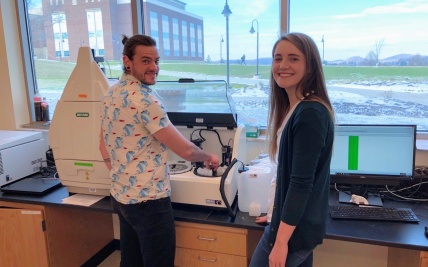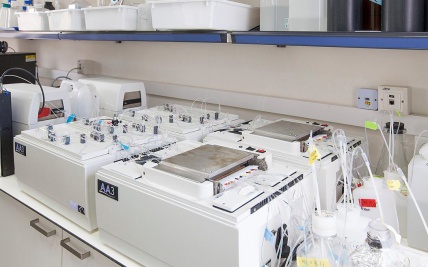Lake Superior State University Accelerates TKN and Nutrient Testing with SEAL Analytical
.jpg?resolution=1105x622&quality=95)
Modernizing a university research lab’s nutrient analysis with automation, reliability, and support
When Prof. Benjamin Southwell and the team at LSSU’s Superior Analytics lab set out to modernize their environmental analysis lab, their goal was clear: increase throughput and improve the reproducibility of nutrient analysis while training the next generation of chemists. Like many university-based water and soil research labs, their team was burdened by traditional wet chemistry techniques, particularly for complex methods like Total Kjeldahl Nitrogen (TKN) analysis.
Over the past decade, SEAL Analytical has become an integral partner in LSSU’s transformation, beginning with their first discrete analyzer and culminating in a multi-instrument setup that continues to scale with their needs.
The Challenge: Time-Intensive Manual TKN Analysis
There are days that you ruin a whole day's analysis in a matter of a second, you made a wrong lab decision, and that can be disheartening to the team.
At the time of the lab’s expansion, LSSU was running around 10–15 TKN samples per day using manual Kjeldahl digestion and wet chemistry methods. For a university juggling academic instruction and client contract testing, this created two key bottlenecks:
- Limited throughput: The lab couldn’t scale sample intake for outside clients.
- Training gaps: Students often struggled with the complexity and inconsistency of manual workflows.
Even experienced technicians risked losing a full day’s work due to a single misstep during digestion or analysis.
Automating Nutrient Testing with the AQ1 Discrete Analyzer and Walk-Away Digestion
In 2013, LSSU implemented their first AQ1 Discrete Analyzer, transitioning key nutrient tests such as nitrate, nitrite, ammonia, phosphate, and TKN to an automated platform. The AQ1 delivered:
- Faster analysis: Reduced time-per-test for TKN and other nutrients.
- Reproducible results: Higher data consistency across operators.
- Better student experience: Easier onboarding and training on automated workflows.
- Reduced waste and consumables costs: Limited chemical use with less than 1 mL of sample and reagent per test
But perhaps most impactful was SEAL Analytical’s support. “They answer the phone every time we call, and they'll sit and work us through what we did and how to get the machine operating again.” says Mr. Southwell, “Their service support network has been nothing but a joy.”
To further streamline the Total Kjeldahl Nitrogen workflow, LSSU also added SEAL’s BD50 Block Digestion System to their workflow. The BD50 enabled walk-away Kjeldahl digestion of TKN samples, significantly reducing what is often the most time-intensive and error-prone step in the process.
Scaling with the AQ300 and Walk-Away Digestion
…we've really increased our throughput from a sample analysis standpoint.
As sample volume and academic research needs continued to grow, LSSU reinvested in SEAL with an AQ300 discrete analyzer purchase in 2019, followed by a second AQ300 in 2021. These newer discrete analyzers enabled:
- Parallel processing: Two AQ300s running simultaneously for increased flexibility and testing
- Higher throughput: Over 100 TKN samples per day, up from 10–15 with manual methods, plus additional tests for other parameters
- Easy maintenance and overnight automation: Improved user experience with simplified system maintenance and additional automation for unattended operation
While the AQ1 was capable of running multiple tests per run, the high number of TKN samples coming in and slower speed of the system resulted in a general use of one analysis at a time. With the increased throughput of the AQ300 and having two systems available, analysis of multiple parameters in a single-run became common place for Southwell and his students.
“Our big transition is multiple chemistries. The AQ300 will allow for several different chemistries to be analyzed on our samples at functionally the same time. From a lab standpoint, we can get things loaded up, and once we're ready to go, just let it run. So we've really increased our throughput from a sample analysis standpoint.”
Long-Term Impact for University Research and Instruction
Since moving to a fully automated nutrient testing workflow with SEAL analyzers and digestion systems, LSSU has:
- Multiplied throughput tenfold, enabling larger project scopes
- Improved cost-efficiency by reducing reagent usage and waste
- Empowered students to work with real-world instrumentation
- Built a sustainable lab model that balances education and research services
- Maintained confidence in data quality and reproducibility, even with changing staff and student cohorts
“I'd recommend SEAL Analytical without reservations from a company standpoint and a technology standpoint…providing a high level of customer support and a quality instrument.” Southwell shared. “The AQ300 has been rock solid in our lab…and it continues to perform.”
Explore the Systems Powering LSSU’s Success
Ready to upgrade your lab’s capabilities and streamline nutrient testing?
Whether you're teaching future scientists, running grant-funded research, or offering contract environmental testing, SEAL Analytical’s nutrient analyzers and digestion systems are built for university research environments.
🔗 Explore SEAL Discrete Analyzers



